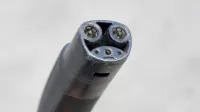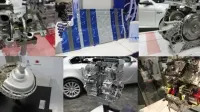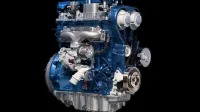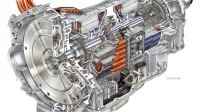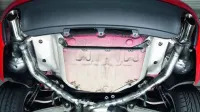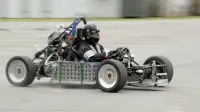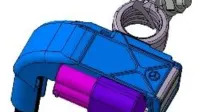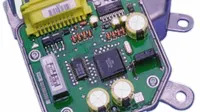Sae
SAE 2010: Affordable technology key to meeting the 2016 CAFE rules
Affordability as the watchword Tuesday as automotive engineers at the SAE World Congress discussed how to meet the new 2016 corporate average fuel economy standards. Automakers will have to get their fleets to an average of 34.1 miles per gallon (35.5 equivalent with other factors for the EPA CO2 limits). Most automakers are already well on their way to this level with their next-generation designs. However, to do it they will
SAE 2010: General Motors investigating battery electric urban commuter for 2015 and beyond
2010 Chevrolet Spark – Click above for high-res image gallery
SAE 2010: Next-gen Ford EcoBoost engines to get even more efficient with cooled EGR
Over the course of 2010, Ford plans to aggressively ramp up its EcoBoost engine strategy with two new four-cylinder engines and the first rear-wheel-drive application of the boosted 3.5-liter V6. However, this is just the beginning as Ford is already hard at work on the next generation of EcoBoost engines. At the SAE World Congress on Wednesday, Dan Kapp, director of powertrain research and adv
SAE 2010: Next-gen Ford Ecoboost engines to get even closer to diesel with cooled EGR
Over the course of 2010, Ford plans to aggressively ramp up its Ecoboost engine strategy with two new four cylinder engines and the first rear-wheel drive application of the boosted 3.5-liter V6. However, this is just the beginning as Ford is already hard at work on the next generation of Ecoboost engines. At the SAE World Congress on Wednesday, Dan Kapp, director of powertrain research and advanced engineering, and Bob Fascetti, director of larg
SAE 2010: GM confirms next generation two-mode and mild hybrids coming
AutoblogGreen had a chance to chat with Micky Bly, executive directory of hybrid vehicle development and batteries at General Motors the evening before the opening of the 2010 Society of Automotive Engineers World Congress. We asked Micky about GM's plans for hybrid vehicles going forward. While its former partners Daimler,
SAE 2010: Ford confirms Explorer, F150 Ecoboost, ups production target to 1.5M
On Tuesday, Ford's VP of global powertrain development Barb Samardzich will be addressing the Society of Automotive Engineers World Congress in Detroit and Ecoboost will again be at the top of her agenda. Samardzich will confirm that before the end of this year, three more Ecoboost engines will be in production at Ford. The 1.6-liter inline-four Ecoboost will be built at the Bri
SAE 2010: Ford confirms Explorer, F-150 EcoBoost, ups production target to 1.5M
This Tuesday, Ford's VP of global powertrain development, Barb Samardzich, will address the Society of Automotive Engineers World Congress in Detroit, and Ecoboost technology will again be at the top of her agenda. Samardzich will confirm that before the end of this year, three more Ecoboost engines will be in production at Ford, including the 1.6-liter inline-four due to be built at the Bridgend plant in Wales and debut in the new C-Max people m
REPORT: High-tech muffler speakers make diesel engine sound sporty, cut noise levels by 20 dB
An exhaust-system and heating-solution supplier has reportedly engineered an electronic way to modify the sound coming from a vehicle's tailpipe. The company, Eberspächer, claims the innovation can make diesel-powered vehicles sound sportier and add an audible sound track to near-silent electric vehicles.
SAE 2009: Govs. Granholm and Schwarzenegger talk green mobility
Click above to read more about the Governors' opening talk at SAE 2009
The blind and electric drive cars: Death by silent hybrid committee
There has been quite a hub-bub about the dangers of hybrids because they are more quiet than internal combustion motivated vehicles. The National Federation of the Blind (NFB) naturally takes these matters quite seriously and in the Sprin
Dartmouth launches Formula Hybrid student design competition
The Society of Automotive Engineers has been sponsoring design competitions for engineering students for several decades with one of the most popular being the Formual SAE. In that event, teams of college students design, build, develop and race a single seat open-wheel race car, generally powered by some kind of motorcycle engine. In addition to the car itself, they also have to produce technical reports on the car, including cost and performance analysis all of which are judged. Given the real
Clean Snowmobile Challenge draws student teams to develop greener machines
Next month, four teams supported by the National Science Foundation will compete in the SAE Clean Snowmobile Challenge in Michigan. The goal is to develop snowmobiles that leave less of an impact on the environment.
SAE Convergence 2006: The difficulty in implementing effective engine management systems
Just a decade ago, engine management was a relatively simple affair. Spark advance and fuel injection quantities were the key parameters, and the determination of both was a relatively simple matter of determining engine speed and load and using those values to index a lookup table. Nowadays, however, technology to improve power, drivability, and fuel consumption - such as variable valve timing and lift, intake tuning, and variable displacement - have greatly complicated the task of calibrati
SAE Convergence 2006: BMW's Intelligent Battery Monitoring
Battery state-of-charge and state-of-health monitoring is normally thought of as technology that's most appropriate for hybrids, but at the SAE Convergence conference this week, BMW made a good case for including it on all motor vehicles. According to ACAD (the German equivalent of AAA), battery failures account for a full 53% of roadside electrical failures, and the situation only gets worse as increased electrical loads and fuel-saving techniques such as idle start/stop come into play.
NHTSA creating universal standard for automotive 'black box'
Though you may not realize it, your car is probably equipped with an automotive 'black box'. Also known as Event Data Recorders, these devices record information from a vehicle's various sensors during a crash – everything from airbag performance to the angle of the steering wheel to the speed of the vehicle is retained. Though an estimated 90 percent of new vehicles are shipped with the devices, each manufacturer uses their own hardware, software and file formats.
SAE puts a timeline on powertrain futures
At the annual Society of Automotive Engineers (SAE) World Congress this week, speakers and members outlined what powertrains and alternative fuel sources will move tomorrow's vehicles.
New SAE testing methods admonish Toyota, Honda to hold their horses
The dust continues to settle from the introduction of new horsepower testing standards by the Society of Automotive Engineers, and Japanese automakers are finding a few less ponies in their stables. It turns out that the new testing procedures have resulted in lower horsepower ratings for a number of Toyota and Honda models, while American carmakers have gone largely unaffected.
